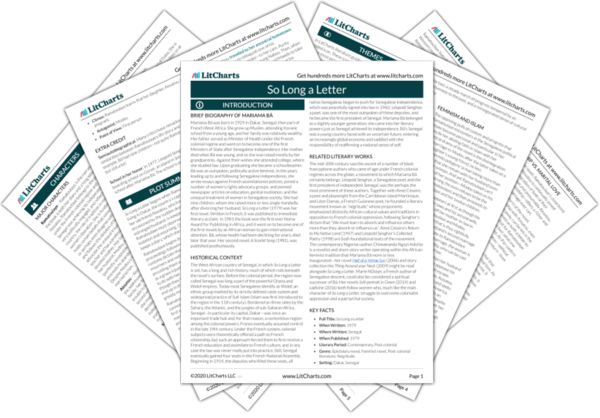Throughout the novel, Ramatoulaye’s close bond with her friend Aissatou is continually posed against the disintegration of both of their marriages. For both Ramatoulaye and presumably Aissatou, friendship—especially female friendship—offers a richer and more intimate connection than marriage ever can.
This contrast is evident in the very form of the novel. Ramatoulaye’s intense feelings of kinship with Aissatou, even while Aissatou lives thousands of miles away, can be felt in the intimacy of her address. The novel is framed as both a letter to a friend and a private diary, and it seems that for Ramatoulaye there should be no distinction between the two: what one friend endures privately, the other one shares. As if to confirm their solidarity in each other’s struggles, Aissatou—without being asked, and without asking for anything in return—buys Ramatoulaye a car.
Modou’s abandonment of Ramatoulaye convinces her that friendship is more resilient and rewarding than marital love. As she writes, “Friendship has splendors that love knows not. It grows stronger when crossed, whereas obstacles kill love. Friendship resists time, which wearies and severs couples. It has heights unknown to love.” Ramatoulaye’s eldest daughter, Daba, echoes this sentiment when she says “Marriage is no chain. It is mutual agreement over a life's programme. So if one of the partners is no longer satisfied with the union, why should he remain?” Then again, Ramatoulaye does not share completely in her daughter’s liberal and pragmatic view of marital love. While she feels that friendship has “greater heights” than love, she also believes strongly in the sanctity of marriage, and the importance of raising children along with a spouse. And, finally, Ramatoulaye’s younger daughter Aissatou II provides a rejoinder to Daba’s pragmatism, and with it a glimmer of hope: Aissatou and her husband-to-be are deeply in love, yet they also succeed in maintaining a practical, mutually respectful relationship.
While Ramatoulaye is skeptical of the institution of marriage, and wary of the particular injustices it has wrought in her own life, she meets marital love with a kind of stoicism, upholding it as a duty that one must take on, if only for the sake of one’s children. However, it is in friendship—especially friendship with Aissatou—that Ramatoulaye finds real strength and emotional fulfillment.
Friendship vs. Marital Love ThemeTracker

Friendship vs. Marital Love Quotes in So Long a Letter
To overcome my bitterness, I think of human destiny. Each life has its share of heroism, an obscure heroism, born of abdication, of renunciation and acceptance under the merciless whip of fate.

Unlock explanations and citation info for this and every other So Long a Letter quote.
Plus so much more...
Get LitCharts A+I was irritated. He was asking me to understand. But to understand what? The supremacy of instinct? The right to betray? The justification of the desire for variety? I could not be an ally to polygamic instincts. What, then, was I to understand?
Friendship has splendours that love knows not. It grows stronger when crossed, whereas obstacles kill love. Friendship resists time, which wearies and severs couples. It has heights unknown to love.
Even though I understand your stand, even though I respect the choice of liberated women, I have never conceived of happiness outside marriage.
‘You forget that I have a heart, a mind, that I am not an object to be passed from hand to hand. You don't know what marriage means to me: it is an act of faith and of love, the total surrender of oneself to the person one has chosen and who has chosen you.’
Daouda Dieng was savouring the warmth of the inner dream he was spinning around me. As for me, I was bolting like a horse that has long been tethered and is now free and revelling in space. Ah, the joy of having an interlocutor before you, especially an admirer!
When we meet, the signs on our bodies will not be important. The essential thing is the content of our hearts, which animates us; the essential thing is the quality of the sap that flows through us. You have often proved to me the superiority of friendship over love. Time, distance, as well as mutual memories have consolidated our ties and made our children brothers and sisters. Reunited, will we draw up a detailed account of our faded bloom, or will we sow new seeds for new harvests?
‘Marriage is no chain. It is mutual agreement over a life's programme. So if one of the partners is no longer satisfied with the union, why should he remain? It may be Abou [her husband]; it may be me. Why not? The wife can take the initiative to make the break.’











